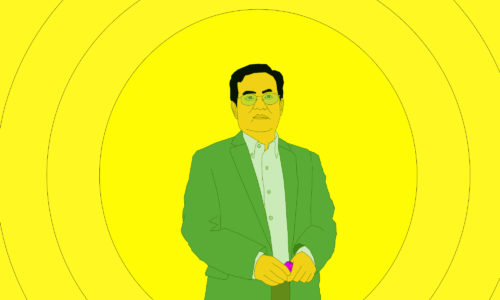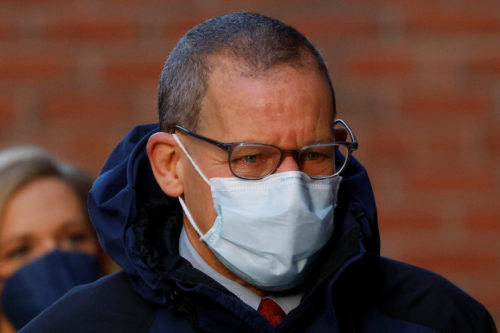A scientist’s future hangs in the balance after another failure of the China Initiative
Launched by the U.S. Department of Justice in 2018, the China Initiative is a government program gone rogue. Will it be shut down after the suspensions of half a dozen investigations ended without prosecution or any evidence of wrongdoing?

Is a U.S. government program, set up under the banner of national security, simply an excuse for racist ethnic profiling?
When former attorney general Jeff Sessions launched the “China Initiative” in 2018 under the Trump administration, the goal of the Department of Justice (DOJ) program was to identify intellectual property theft trade cases that would “benefit the Chinese state.” Of over 100 cases listed by the DOJ, almost all are concerned with scientists and scholars of Chinese ethnicity, most of whom are naturalized U.S. citizens.
The unusual emphasis on these so-called “nontraditional collectors” of intelligence — professors, students, and scientists in academic and corporate roles — seems to belie the China Initiative’s stated national security concerns. Going into its third year, the initiative has simply brought more attention to the lack of transparency and accountability within the Federal Bureau of Investigation (FBI) without actually catching any spies.
False charges
In the past two weeks, the DOJ dropped fraud charges against six scientists of Chinese origin in six separate cases under the China Initiative. The DOJ did not explain its reason for the dismissal in any of these cases, but there did not appear to be any evidence for prosecution to proceed.
Among them is Dr. Qing Wang (王擎 Wáng Qíng), a former Cleveland Clinic researcher specializing in heart disease. Wang was born in China and became a U.S. citizen in 2005.
In May 2020, Wang was arrested under false claims and charged with wire fraud. Alleging that Wang was a participant in the Thousand Talents program — a Chinese government project to lure scientific talent back to China — the DOJ accused him of receiving a more than $3 million grant from the American National Institutes of Health (NIH) while receiving money from the Chinese government. Since 2018, the FBI has been targeting attendees of the program to address intellectual property theft threats from China.
The DOJ released a statement on July 15 that the case was dismissed without prejudice, declining to offer further comment on the issue. It has since been removed from the department’s list of China Initiative investigations. The aborted investigation led scholar Margaret K. Lewis to write a piece arguing that it is “time to end the U.S. Justice Department’s China Initiative.” She says, “Like several other cases involving ethnically Chinese researchers under the China Initiative, the authorities appear to have gone far beyond any reasonable remit.”
Then last week, the DOJ dropped all charges against Táng Juān 唐娟, a visiting researcher at the University of California, Davis School of Medicine. Her jury trial was set to start on Monday. She had been arrested in July last year for allegedly concealing her military affiliation. She was another victim of the China Initiative.
Wang and Tang are not the first targets of the China Initiative who have been proved to be completely innocent. But no matter the result of the case, the scientists arrested and accused by the program have had to cope with a severe disruption of their careers: Wang and Tang, for example, both lost their jobs.
The first China Initiative trial in deadlock after mistrial
Although many lives have already been disrupted by the China Initiative, the first person accused under it to be put on trial was nanotechnology professor Anming Hu (胡安明 Hú Ānmíng) of the University of Tennessee (UT), Knoxville, in late June. And as you might expect by now, it turns out that there was no real evidence against him.
U.S. District Judge Thomas A. Varlan declared a mistrial after the jury notified him of an “impasse” despite a three-day deliberation process.
The DOJ has to decide by July 30 whether to pursue the trial, but many observers said the session that ended in deadlock had already revealed that Hu was falsely prosecuted by federal agents for fraud.
Hu was arrested in February 2020 under three charges of wire fraud and three counts of making false statements. During the litigation process, the government cited the “NASA restriction.” Formally known as the Wolf Amendment, Congress passed the legislation in 2011 prohibiting the National Aeronautics and Space Administration (NASA) from funding research that has ties with the Chinese government and state-affiliated corporations.
The government accused Hu of failing to disclose his ties with a Chinese university when he received a NASA grant.
Hu, who left China over 10 years ago to pursue his doctorate in Canada and later became a Canadian citizen, started to work at UT in 2013. He is an expert in nanotechnology and was an associate professor in the university’s Mechanical, Aerospace, and Biomedical Engineering Department until being fired due to the prosecution.
Shortly before he accepted the post at UT in 2012, Hu was offered a short-term contract to teach and conduct research at Beijing University of Technology that lasted for less than a month, according to Hu’s defense attorney, Phil Lomonaco, at a press briefing after the trial. The university had applied for grants under the Thousand Talents program to fund Hu’s short-term visit. Hu did not directly receive government funds.
Lomonaco said that Hu’s income from Beijing University of Technology does not qualify for conflict of interest under UT policy, which defines it as an individual holding more than 5% financial interest in an outside venture that uses their university position to provide an “unfair advantage” to that venture.
As a result, Hu did not list a conflict of interest in 2014 when he completed the UT forms. However, he did disclose his ties to the Beijing university in at least two of the required forms, as well as in email exchanges with the university administrators and a NASA contractor when he applied for the NASA research grant in 2016, according to Knox News. In those documents, Hu listed his affiliations, collaborations, and the students he worked with in Beijing. He also sent an email from a professor at Beijing University of Technology to both NASA and UT, which described his collaboration with Hu.
Since then, Hu has completed two projects with the NASA grant.
A bored FBI agent uses Google
In March 2018, FBI agent Kujtim Sadiku came across Hu’s name using Google, and found a news release. Written in Chinese, about Hu’s short-term contract with Beijing University of Technology, Sadiku used Google to translate the document and “predicted” that Hu was part of the Thousand Talents program. The next month, Sadiku and an agent from the Department of Energy knocked at Hu’s door and asked him if he was a member of China’s Thousand Talents program, to which Hu said no.
Sadiku then asked if any Chinese institutions had offered Hu speaker opportunities or paid for his seminars, and Hu said that one university in China had invited him to talk. According to an FBI memo obtained by Hu’s defense attorney, Sadiku asked Hu to attend the seminar and talk to the FBI about it when he is back. Hu answered that he was too busy and did not attend the seminar.
Lomonaco accused the FBI agent of attempting to recruit Hu as a spy based on that conversation. When he first told the agent about his research under the NASA grant, Sadiku did not say anything about it, Lomonaco said. But for a year and nine months after that initial encounter, Sadiku conducted a formal economic espionage probe, investigating Hu and his family, and spying on Hu and his son, then a freshman at UT.
In July, August, and September 2019, the FBI showed PowerPoint presentations to UT administrators about their investigation of Hu, which were “replete with inaccuracies and lies,” such as allegations of Hu’s ties to the Chinese military, according to Lomonaco. After failing to find direct evidence of Hu’s Chinese government links, the FBI shifted its focus to the NASA grant that he had applied for years after his contract with the university in Beijing. Specifically, the FBI accused Hu of intentionally not disclosing his work at the Beijing university in a single annual form submitted to UT. Federal prosecutor Matthew McKenzie said that Hu avoided mentioning his work in order to receive the grant.
However, the rules prohibit only employees of the Chinese government and China’s state-affiliated corporations — Hu was and is neither, said Lomonaco.
“He is an innocent person who got his job taken away and his life ruined,” Lomonaco said.
Hu was released from jail and put under house arrest a few weeks after his arrest last February. During the time when he was confined in his house, Hu’s work visa expired, at which point UT stopped paying him. Hu’s wife, Ivy Yang, had to work alone in Canada to support the family.
“Despite suffering from type 2 diabetes and needing regular medical care, Anming was not allowed to see a doctor or even get some fresh air at the deck of his home for almost a year. Only in February 2021, with the help of our attorney and my request for his basic human rights, was he permitted to go to the deck,” said Yang during a press conference hosted by the Tennessee Chinese American Alliance during the trial.
Yang and Hu’s oldest son left UT and returned to Canada, out of fear he would no longer be able to pursue his studies in computer science in the U.S. Their younger son, a senior in high school when Hu was arrested, ended up dropping a few classes.
“How can I explain this [to] them? How can they process and understand the injustice that their father is facing? How can I address the trauma they are experiencing? What can I do to face something that is so much larger than me?” Yang asked.
In a press briefing held by Asian Americans Advancing Justice | AAJC after the trial, Hu said that he would continue fighting for his innocence and keep pursuing his research and green card application, which was terminated as his work visa expired during the house arrest.
A rogue government program causes a brain drain
Advocacy organizations and local politicians have demanded the DOJ drop the charges against Hu. On June 17, shortly after Hu’s trial, Congressman Ted W. Lieu (D-CA), Congressman Mondaire Jones (D-NY), and Congresswoman Pramila Jayapal (D-WA) wrote a public letter to DOJ Inspector General Michael Horowitz. The letter urges him to launch an investigation into FBI misconduct and reconsider the purpose of the China initiative.
In their letter, the congresspeople specifically ask, “Did racial or ethnic profiling occur in this case?” and “Does the China initiative put untoward pressure on FBI agents or Department of Justice prosecutors to engage in racial or ethnic profiling?”
It is important to draw the line between Asian Americans or people of Asian descent and the Chinese Communist Party, and that’s the purpose of a government investigation into the FBI initiative, Lieu said during a webinar held by advocacy organizations last month.
“The China Initiative is premised explicitly on the theory that there is ethnic affinity, and thus a propensity on the part of people of Chinese descent — even if [they are] United States citizens or Canadian citizens — who act in violation of American law for the benefit of Beijing,” said Frank Wu, a law professor and the president of Queens College at the City University of New York.
The FBI has more than 2,000 investigations that could be linked back to China. Many are concerned with grant fraud, false statements, and undisclosed research affiliations with the Chinese government — but those charged could easily be results of small clerical errors, sloppy paperwork, or changing standards of disclosure.
“Even when they fail to identify what is sought, economic espionage committed by agents of the People’s Republic of China government, they continue on because they need to produce statistical accomplishments for the program,” said former FBI agent and Brennan Center fellow Michael German during a press briefing held last month.
When the China Initiative becomes a numbers game, he continued, the attention is distracted from national security: “Diverting cases to fit statistical accomplishments for a specific program can cause more harm to our national security than it resolves.”
One of those effects is a brain drain: The China Initiative is ironically helping the Chinese state to a long-sought goal: recruiting overseas talent back to China.
In 2017, the FBI and NIH started a 17-month investigation of the employees at Houston’s MD Anderson Cancer Center, aiming to identify China-related economic espionage. The FBI accessed the network accounts of 23 employees, and a few researchers of Chinese ethnicity were put on leave or under video surveillance. One of the affected researchers was an award-winning epistemologist and naturalized U.S. citizen, Xifeng Wu (吴息凤 Wú Xīfèng). The investigation caused Wu to return to China, where he has been playing a major role in COVID-19 treatment research.
“The only thing we’ve lost to China is our investment in Xifeng Wu,” Lynn Goldman, dean of the Milken School of Public Health at George Washington University, told Bloomberg.
Meanwhile, Professor Hu Anming’s future is in the balance: The DOJ has until the end of this week to decide whether to continue pursuing its apparently baseless case against him.






